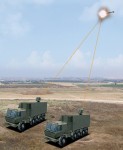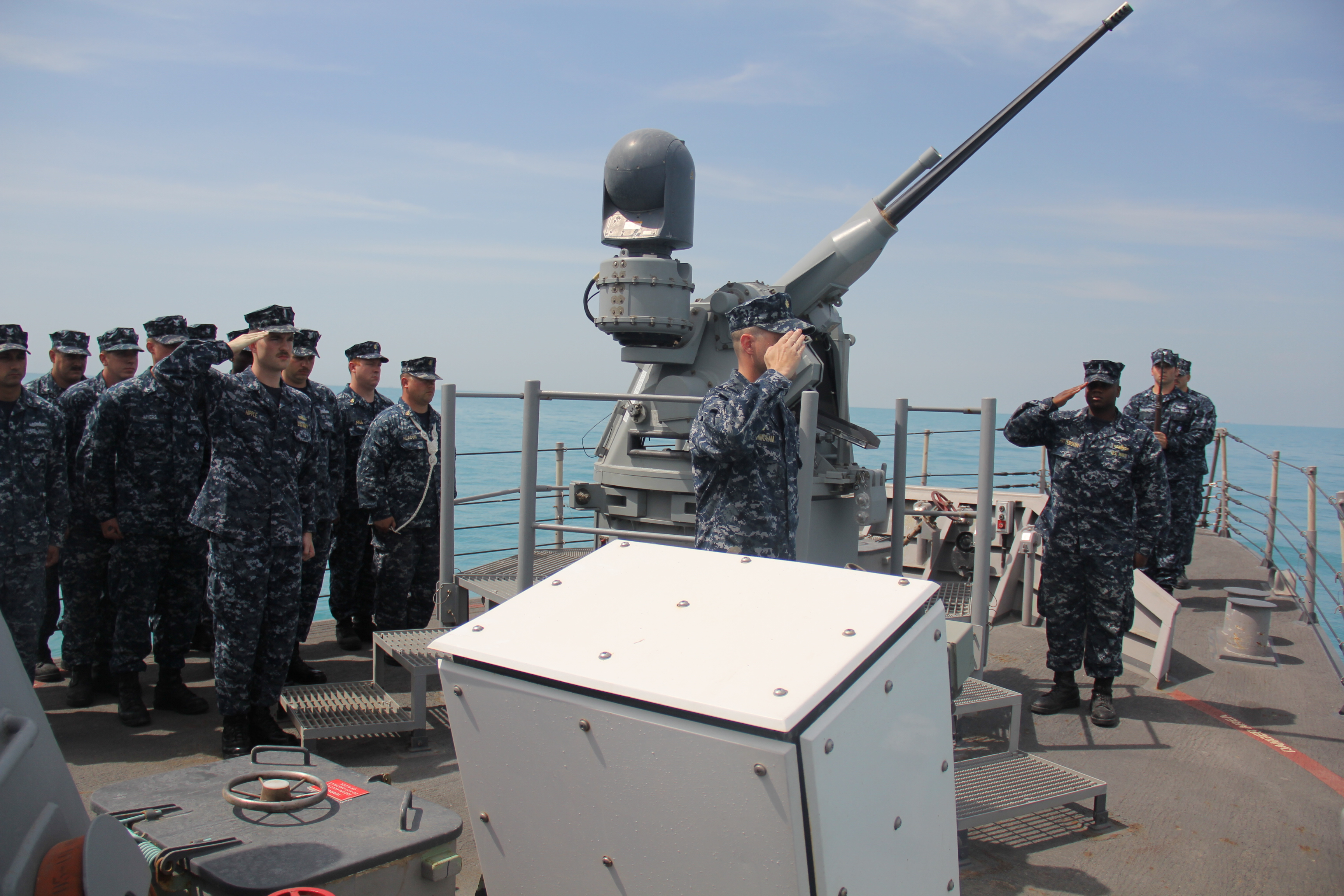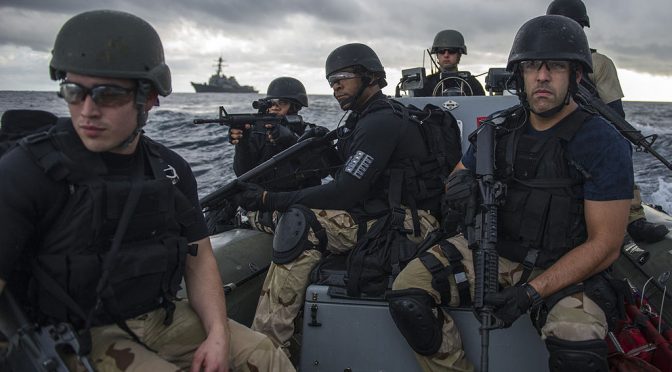By Matt Hipple
In the most recent edition of Proceedings, CDR Darcie Cunningham, USCG, describes what she sees as the strategic challenge of cultural friction between millennial expectations and the rigors of professional military duties in an article titled, “Millennials Bring a New Mentality: Does It Fit?“
Now, mind you, I can be pretty dismissive of my own Millennial generation at times, but the reality is that our newest generation of Sailors are professional, courteous and – based on the fact we are the most kick-ass navy on the planet – doing a damn fine job. For the USCG, the service of the author, I’m often jealous of the exotic, far-afield deployments of their Mobile Training Teams and the challenging mission they do with our partners. As a Patrol Coastal guy the Gulf, I was glad to have the WP’s there to carry some of the load. Here at home? The response during Hurricane season is always a testament to the Sailors of the Coast Guard. Is there REALLY a strategic “millennial culture” problem or are we using the idea to run away from our REAL problems?
To answer the first part of that question, I will endeavor to respond to 12 major points posed by CDR Darcie Cunningham. I hope this better frames the reality of the “millennial issue.”

1. “This generation has me questioning how they can acclimate to the highly traditional, structured U.S. military.”
To the cognitive bias about “traditional (&) structured” – let’s talk about a generation in “general” terms being able to acclimate to those traditions and structures. The article is right – the millennial generation cannot row for days on end and do not like the sound of leather drums. I also find the horned helmet a bit heavy and the hamlets we burn down a bit boring. I also do not feel it necessary to fire cannon salutes upon the departure of the CO’s dinghy – I would note that getting Non-Combat Expenditure Allocation (NCEA) can be a pain, and I’d like to maximize the ammunition I have for training. I would also likely die if subjected to liberal use of lashings. Barring that, I would then likely chafe at the idea of paying for my commission or being rejected due to my family’s social standing. I also do not have the disdain for my steam plant engineers that other Union Officers have. Finally, I do not, in fact, know how to splice a mainbrace. That said, we do power some of our ships by rending apart the very base material of the universe. The ships that burn boring ol’ dead dinosaurs can shoot a bullet down with another bullet in space. You take what you can get, I guess.

2. “The younger generation postures to work only the bare minimum number of hours required. Additionally, they continuously request more time off in the form of early liberty, shorter workdays, the ability to go home after an office luncheon, and so on.“
With greatly decreased crew sizes and 8-10 month deployments, can we REALLY complain when people try to get some extra leave in? Can we even claim they “work less”? Long-gone are the times of a 300+ DDG crew and a rope-yarn day. Is this “extra” time off, or just normal requests that are now a bigger deal due to the normal workload. Now, that said, if there is time for an “office luncheon”, likely there is nothing critical going on and no reason to stay around the office for tradition.

3. Upon hearing they would not be in-zone for promotion or advancement in a given year, these younger members declare they are fed up with the service and wish to resign. They have an expectation of accelerated advancement through the organization, without regard for the value that experience provides to those in leadership positions.
People complaining about being looked over for promotion would seem completely in-line with reactions since the time some random Athenian strategos was looked over for command during the Peloponnesian War.

4. There are an increased number of negative confrontations between very junior members and senior leadership. Rather than saying “Yes Sir” or “Yes Chief” when tasked with a project or simple task, our newer members frequently question why they have to do it.
First, we now have different mechanisms of enforcement. Before my time, there was the threat of getting roughed up – that no longer exists. Naturally – mechanisms exist in NJP, counseling, discussion where appropriate, etc… but threats & violence were damn scary, and likely without it there will be naturally more friction than before – and a good thing too BECAUSE…

Our systems are increasingly based on technical knowledge that decision makers will not have without prior in-depth training. There will be no more Da Vinci-like experts of all things. Where once it was possible to master the knowledge of a ship in 10 years – it can now be a challenge to truly master the nature of some single systems in 20. While belligerence is not excusable, is all this actually belligerence from the subordinate or sensitivity from the superior? I’ve seen some Petty Officers forced to get pretty bellicose in order to avert a stubborn lurch towards disaster. Once in awhile, I was the one lurching – and thank God for their candidness! These are motivated, intelligent, and dedicated folks. Maybe part of leadership is to know when that “why” or “what” comes from a place of honesty – I find it is not for the purpose of avoidance or excuse, but a desire to understand or improve. It’s an opportunity.
If I may, I would also quote Alex Smith’s lovely post at the USNI Blog, the “Call of the Deep.” In it, he notes, “Mahan’s diary as a junior officer is a fascinating read. Many of his entries lament about his fear of drinking too much and his abhorrence of superior officers. ‘The Captain has annoyed me, and I have felt and spoken angrily and sullenly.'” Oh, that rascal millennial and his complaints – and a diary? Pshaw!

5. Customs and courtesies are eroding. Juniors are no longer smartly saluting seniors or verbally acknowledging higher ranks. On an almost daily basis, I hear, “Hi, how’s it going?”
There is some truth here. Perhaps we can be a bit more informal at times. It’s not a deadly sin, if a sin at all, but I suppose there are places where we could shore things up a bit. I, for one, do find more use in candid superior-subordinate engagements that usually lead to a bit more informality. That said, once I leave my office for lunch, I am pretty much saluting until I get back indoors if there is heavy foot traffic. I don’t see any slack in the saluting department and, personally, I like it. It allows me to salute back- which is the part I like. Call me a romantic.
6. Texting is becoming the primary mode of communication. It has already become a means of jumping the chain of command as a condoned communication tool.
Before we start, let us be clear about the problems here – “Jumping the chain of command” is not a “texting” problem. That is like saying a negligent discharge is a “bullet” problem. We shall touch on both.
To jumping the chain of command: Do we really see that much? I would say no. Let’s not stop there, however. When we do, is it always so bad? Is the problem one of people being sneaky or people trying to get things done in a timely manner. We all read the message-to-Garcia story as MIDN – is an hour of work-stoppage waiting for approval acceptable in an already daunting pile of PMS and repair issues? Of course, we do have an increasingly large number of supervisors and mangers running in parallel… perhaps an up-tick in “jumping the chain of command” is a natural side-effect of the increased number of bosses and not a symptom of generational issues?
To texting: there was a time when Sailors crossed the brow and didn’t come back until the next day – or Monday. There was no command expectation to have a cellphone leash at all times. In fact, many commands now require Sailors to have cellphones so they can be recalled. Texting is a short, to-the-point communication that can be sent to the entire command’s pocket – the ability to “leave a text” so someone comes in after a major casualty or maybe just a quick tool for finding people in one’s work-center. Sounds like a success for readiness.

7. We must educate them on the importance of patience in our systems.. If this doesn’t sit well with a young member, he or she should be subtly reminded of the current economy and associated unemployment rate.
A subtle reminder that if many of our management methods were used in a competitive market, our company would be exterminated within months. Anyone who clung to these systems because they were “what we had”, advocating for them merely because they were what they knew, would be quickly fired. Anyone who could think critically about these issues would be well on their way to success (though, granted, those who just complained about them endlessly would ALSO probably be fired). Must we automatically ascribe selfishness to the folks who think we can do better? If our service members expect our world-class military to function on a world-class level, good on them! If we say we’re the best, we should want to be the best.
8. They need to be “course-corrected” immediately if they show signs of insubordination or disrespect.
This happens every day – I have seen it, done it, and had it done to me. It is correct and appropriate. However, we must be careful to realize that, while the line may be fuzzy, informality is not “disrespect” and disagreement is not “insubordination” – the latter especially.
9. We must get back to basics. Customs and courtesies are the foundation of our military traditions.
(later)
While I embrace the fact that we have a new generation that’s better educated, technologically astute, and poised to preserve our nation’s liberties, I also hope we can find a middle ground that will capitalize on their strengths and preserve our proud traditions.
We defend the constitution; we fight and win our nations wars – THAT is our “basic”. THAT is our foundation. THAT is our #1 priority. In Norfolk, there is a stand that claims to hold the lovely wooden helm from the USS MAINE – replaced for metal as our relationship with Spain began to strain. The customs and courtesies that change with time and tide as we pursue the mission are for us to decide and are of secondary importance.
As for where that tradition comes from, from E-1 to O-9, we all take part in creating a service-wide culture that merges tomorrow’s yesterday with ours. This gets at the subtle problem with the turn of phrase used here. Customs and Courtesies are not the foundation of our military tradition. Our military tradition is defined by our customs and courtesies. The article is right – things have changed. They always have. Harness that and use it – many of these things have changed for a reason. Tradition is not something we keep preserved in a jar passed to us in perfect form from the first Sailor. From our youngest SN with his iPad to our flush-faced comrades in the Continental Navy after a night of grog – each of Sailor in their own time is creating tradition for the next generation.
10. They also need positive feedback early and often. Little gestures such as going to their offices and offering accolades for jobs well done gives encouraging reinforcement and the feedback for which they hunger….
I’ll be the first to admit there are many things about my generation I cannot stand, though I reject that this characterization is correct for our warfighters – but, let’s entertain a small kernel of truth here. Why DO millennials sometimes engage in such childish shenanigans?
It’s this very perspective that enables nonsense. No, don’t treat your grown-up, educated subordinates like children; they are not gentle flowers. Do not create the self-fulfilling prophecy by choosing the easy, comfortable route of leadership by coddling and participation trophies. What they’re looking for is constructive input – good and bad- not blind accolades.
11. And finally . . . this needs to be said: We must be prepared for the tough conversation. Will they truly be able to adapt to the service?
Truly realize who we are talking about. These are uniformed service members who joined up in wartime to make a difference – what they’re looking for is knowledge and relevance, not a fight with their boss or some empty accolade. It is a mature desire, one informed by a drive to defend our way of life, in the best way they can, at potentially shattering cost.
12. “If millennials are more focused on what’s in it for them, they may not be the right fit.”

I may have neither risked nor sacrificed as much as many of my friends who served on the front lines of the Global War on Terror, but I did serve on the USS FIREBOLT and refurbished the 3 stars embedded in the floor of the mess decks. From the 2004 terrorist attack on ABOT and KAAOT, one of those stars belongs to DC3 Nathan Bruckenthal, first USCG wartime casualty since Vietnam. He didn’t ask what was in it for him.
Millions have gone out to the front lines of our global war against terror and not asked what was in it for them. Thousands have not come back – they did it for what was in it for us, the ones that live. They are all Americans, but one could throw a superficial label like “millennial” on many. Remember, when we write these kinds of articles, we are talking about leading people who, in the course of war, will have to kill – and some may have to die – in the service of their country. This kind of “millennial this” and “millennial that” talk doesn’t match that reality. This kind of talk is NOT what -we- should have “in it for them.”
I by no means think the purpose of this article was to ignore the great work of our shipmates, the ultimate sacrifice of our comrades, or the potential of so many others to bear that burden as well – but nevertheless, this kind of sentiment ultimately ignores it.
Matthew Hipple is a naval officer by choice and millennial by cruel twist of fate.


Despite your impassioned defense, I think CDR Cunningham’s article was spot on. In fact, the problem is much larger than just the Navy or Coast Guard. As retired military, I am now a defense contractor and I see many of these same millennials acting like spoiled brats in the commercial/DoD world, by demanding promotions after less than a year on station and demonstrating complete disrespect for experience and seniority. They want to be the boss and they want it now.
Most of all, we have a real problem with work ethics, with too many people now regarding the 40-hour work week as merely a suggestion. If this attitute gets traction in the military, we are in real trouble. Nor am I moved by pleas that “we are under-resourced and over-worked,” – do you think it was any different in 1898? The military is almost always under-resourced, so get used to it.
That being said, I believe that Cdr Cunningham’s piece will be swept under the rug, because higher command will regard any attempt to reign in problems as detrimental to recruiting and retention. However future historians, looking back to try and find out why we lost a naval battle at some point down the road, may find it illuminating.
They’ll look back at people like you who failed to provide effective leadership for their subordinates. If your company is having pervasive problems with their younger recruits….well that sounds like a “you” problem.
And don’t forget, your generation is not the one spilling blood in this war. It is ours.
I am not in a corporate leadership position. If I was, I would fire people who consistently fail to perform and can’t even put in a 6-hour day. I would expect the same if I behaved that way, too.
I’ve been in more than one company and have worked at multiple DoD agencies, where this work ethic issue is becoming more readily apparent.
I work alongside plenty of Iraq and Afghan vets and very few of them ever shed any blood. You seem to have forgotten the sacrifices made in the military by previous generations, including mine and my father’s generation and sound as if you’re the only ones who ever paid a price for serving your country. My family paid a price. Your arrogant, self-centered attitude tends to confirm LCDR Cunningham’s article.
BTW, was MG Greene part of your generation? A number of my classmates have died or been wounded in the Mideast in the past decade, so don’t arrogantly assume that your generation “owns” a war. It is America’s conflict, not yours.
Wow…we’re going to lose a battle because of millennials, eh? That’s a pretty stinging critique with absolutely zero empirical evidence to back it up, only an ethereal “feeling” by certain authors that millennials don’t address the world exactly as their “wiser” predecessors.
Every generation has been doubted by its immediate ancestors. I sincerely thank you and CDR Cunningham for giving us more naysayers to silence.
We will lose a future naval battle because of ridiculous procurement and a dogged insistence on weeding out the best and brightest who question why (for example – if I commonly am asked to work over 40 hours a week and have done repeat deployments and am expected to be constantly reachable by cell phone at hours of the day, should I be made to sit at a desk for a set number of hours a week just to satisfy some cranky old vet?) in lieu of the quiet and compliant. I’m sure Patton or Caesar would’ve put in an “honest forty” instead of cutting out early to hang out with the wife and kids.
Amen to that repsonse to Paul. His reply basically played to the stereotype of the millenial individual as egotistical and all about one’s self. I certainly can only hope that he is actually in the minority, as many of the enlisted folks that I have worked with show much better bearing and attitude.
CDR Cunningham’s article is nothing more another blanket attack article full of anecdotes on how millenials are screwing things up. I can’t speak for how USCG Base Long Beach is run, but the junior sailors I encountered in recently in training at Naval Base San Diego after having been overseas for the last four years were sharp and courteous. The two I did correct were not malicious and receptive to their feedback. Perhaps this CO should look within to her own leadership rather than dismissing an entire generation as substandard and non-conformist and whinging about it in an article… or would it be fair for me to lump her in with all the COs of her generation lining up to get fired for to misconduct?
This response reads more like an apology than a rebuttal The author simply dismisses the main points of the original article, then justifies the actions referred to in the original complaint. It is representative of weak analysis and a lack of introspection by someone who was stung by criticism.
If there weren’t a problem, the original article probably would not have been written. In the Army, we face many of the same issues. Just as there was a difference in attitude between the baby-boomers and the gen-X’ers, there is a difference with the millenials. Its irresponsible to imply that the very obvious changes in society over the last 30 years have not changed the ethics of the nations youth.
“If there weren’t a problem, the original article probably would not have been written.”
You are implying that every time someone complains about something, they are always correct in identifying
A) The problem itself
B) Its cause
C) Its solution
Could it be that one author, biased by the perspective of a ‘webinar,’ confused their perception of their small slice of the military pie with an entire generation of 50 million people? (Inconceivable!)
“Just as there was a difference in attitude between the baby-boomers and gen-Xers, there is a difference with the millenials.”
Yes, the old have always complained about the young… because they’re young. Inexperienced. Brash. Enthusiastic. Optimistic. Idealistic. They grow up and (just like the Gen-Xers now), assume positions of leadership. In 2030, when we gosh-darned Millenials begin serving as flag officers and run these institutions, will you wish you spent more time leading and guiding them… or blaming them for how they adapted to a world their elders created?
Funny, my guys always did what I asked them to do. If yours don’t, take a hard look in the mirror for the answer. And practice yelling “get off my lawn,” from your rocking chair.
Amen, Mikey. I was an XO at a unit with a whole dogpile of Millenial types, and don’t remember feeling indignant or offended by a perceived display of self-centered attitude.
Yes, they tend to be less formal, but I don’t see this as disrespect. We have to remember that this is a highly collaborative generation, and their workflow is a lot different than what we might be used to within an intense hierarchy/bureaucracy.
Managing accelerated expectations is very easy. You simply say, “oh yeah, that’s not going to happen, now go away…” or something to that effect. No reason to get upset.
My biggest shock in younger Millenials is the lack of what I’d call “common skills” like painting a shed or starting a lawn mower. That said, what I experienced was big hordes of ’em anxiously absorbing everything real. A lot of these young people joined specifically to learn things that older generations took as a matter of course – but, I’d say there’s been a consistent erosion of these types of vocational skills for several generations.
Now, get off my lawn!
If they fail to adapt in the ways that preserve the abilities of the force, I will blame them. Millenials are simply unproven. People in the age group I occupy are old enough to understand the decisions our predecessors made, for better or worse, and young enough to still remember how stupid we were fifteen or so years ago in thinking our ideas about how things should run in the military were simply ‘better.’ The traditions and customs we observe aren’t new, they are thousands of years old. They were adapted over time, because there is really only a narrow range of options to choose from when it comes to running a military. Anything organized outside of those principles and is really just a mob.
With age comes experience, and with experience comes perspective. It is a fallacy to simply think the young know what they are doing, or that the ideas and values they have which differ from previous generations will serve them, or the force well in the future, because, quite simply, they may not.
I will not be lenient on them, or simply accept modish attitudes because they are a result of a generational divide, nor will I expect anything but awkward and halting competency until they gain the experience needed to really assume a position of leadership. You, and others responding to this article may simply laugh off the responses of older respondents as the complaints of an irrelevant generation, but age creeps up on us all, and the older you get, the more you come to realize how dumb you were when you were young.
I recognize the comment about “irrelevant generation” as having particular relevance. Although retired, I still support current DoD operations as a contractor and am amazed how some of the younger military people regard anything prior to their entry into the military 3-6 years ago as “irrelevant.” When I mention things we learned about airpower and COIN strategy in Vietnam, it is fobbed off as if I am talking about Ancient Greek warfare. Lessons learned, learning from past mistakes (even just 10 years ago), etc seems not worth the effort today. I am also shocked about the ignorance of our recent military history (even the beginning of OIF/OEF) or Allied Force against the Serbs (we fought the Serbs?) among junior officers – a telling indictment of our military education system. It’s hard to understand a crisis if you don’t know how we got here and it’s even harder to care about the outcome.
I’ve worked alongside some younger enlisted and junior officers who are quite sharp, some even fairly aware of the wider world beyond themselves. Yet I think the wider issue is not a generational one per se – even generation has duds and mediocrities – but a combination of deteriorating educational and ethical bases. Many of the young are afflicted with relativistic thinking and believe that they can decide what is right and wrong, rather than accept some out-dated concepts of duty, honor, country – that can cause real trouble for our military culture if it gets traction.
Most of the comments I’ve seen here in regard to CDR Cunningham’s original article or my response seem to have that smug, “go back to your rocking chair” kind of slant. Well, I’m not in my rocking chair, I and my 30 years of experience are still supporting you across the force, along with many of my generation who are still contributing to DoD. There’s no sin in lacking experience, but ignoring the experience of those who wore the uniform before you is just plain ignorant.
Here’s the funny thing, I agree with most of what you just said-
Every generation must adapt to the challenges we’re faced with.and will be judged in hindsight.
Millenials are unproven.
We have a lot to learn before we’ll be handed the reins of national-level decisionmaking (thank God)
Militaries have a best-organization.
We do not deserve ‘leniency’ or sympathy.
Yes, we will be judged in the future just as you are being judged right now for Vietnam, Korea, Iraq, and Afghanistan. You adapted as best you could with the knowledge you had. We will make mistakes. So did you. So get off the judgmental high horse.
We are unproven. We will prove ourselves- not because we’re all that great, but because we won’t have a choice. Just like Petraeus, Rumsfeld, McNamara, and all the military leaders of history, we won’t get to pick our war- the civilian leadership will- but we’ll fight it.
We do have a lot to learn- I’ve never claimed to know what I was doing. I just tried my best. So did you when you were our age. I remember some of the stories my leaders told of being young officers- they were hardly paradigms of military bearing, and they seem to have come out okay.
Militaries have a best-organization, but that ‘narrow range of options’ is clearly not so narrow: we’re an all-volunteer force. We are employing technologies no military before us has employed. Our war train now includes Field Service Reps, contractors, and permanent civilian maintainers, more than ever before. We’ve included minorities and women in the service. Corporal punishment is no longer legally authorized. We can give and receive orders from all over the world. All this has changed in the last 50-100 years (despite being heavily resisted by the traditionalists of their era), and we’re doing okay.
I respect what you, RMM, CDR Cunningham, and all the warning-crowd have to say. it’s the warning the elder have had for the younger since time immemorial: “You’re snotty, immature, and too dumb to know what it is you don’t know.” You’re absolutely right. I can’t speak for 50 million people, but I’ll admit I’m all of the above. But that’s always been the case, and my generation’s mistakes won’t be the end of the civilized world just because we didn’t grow up with the Brady Bunch and the Cold War.
Right. Unproven by the longest conflicts this nation has ever seen.
If you treat people like robotic shmucks that only cut the mustard if they look / walk / talk / act like you do, then you’ve already made up your mind.
This often an officer corp issue, spending many years drawing a non fluid vision of what leadership should look like…(see above) and you will know your fate in 1 week vice grow in a full tour. The military has amazing potential which can be harnessed or stifled-possibly the boomers need to consider hanging the hat? A simple Muse.
http://finance.yahoo.com/news/if-millennials-are-jerks–blame-the-baby-boomers-200028613.html
Worth a read.
Lieutenant – your comments are spot on. The Commander should look in the mirror and around her… it’s her generation and the one just ahead of her that are in the news for conduct unbecoming, abuse, sexual assault, toxic leadership, being relieved of duty – etc etc.
You reap what you sow…promote moral relativism and you end up with a society which has a serious problem with morality, regardless of the generation in which you were born. Just saying…
Right, because generals and admirals aren’t getting pinched left and right for a variety of fiscal, moral, ethical, legal, etc. lapses.
Please leave your thinly veiled country club religiousity out of this. Sorry we don’t all wear tucked in polos and anxiously await a luncheon hosted by the general’s wife.
Recently turned over command of a forward deployed warship. Every day I was blown away by the effort and dedication of my Ensigns and LTJG’s. The biggest challenge each day was ensuring that my leadership was worthy of their dedication. If that sampling was representative of the Millenials who have chosen to serve our Nation, we’re going to be just fine.
Nothing but excuses and that was the point of the original piece. The lack of respect shown by this author is exactly the problem. I certainly would not put my trust in a “shipmate” who is more worried about his phone and time off, and completely fails to understand why his skipper fails to embrace his sense of entitlement, all of which are more important than the job he/she signed up to do.
Change is one thing, nothing is static. Change based on entitlement and disrespect has no place in my Navy.
You don’t get respect, you earn it. In my experience (13 years) every aspect of the military is hopelessly broken above the company level. Logistics (ever try to get a piece of equipment without having to hear about “pots of money”), admin (good luck resolving a pay issue this month), healthcare, a dogged refusal to treat rape seriously; meaningless awards promotions and evaluations; procurement … None of that was done by millennials. Why in the hell do you think you’re entitled to respect?
As leaders, if we can’t figure out how to get the best of our most valuable resources, we fail. I think the author was spot on…instead of complaining about the millennials,we most learn to connect and motivate with them. And oh by the way, when I was an ENS, I’m sure my CO & XO where wondering the same thing.
As a 30 year Master Chief currently on terminal leave, I have found you get what you accept. The new generation of Sailors are no different than generations before. I was that young knucklehead, a few good Chiefs saw potential in me and pushed me. It seems to have worked out in my case. My advice is get out of your office and go meet and work with your little wrench turners, the rest will fall into place.
If you treat people like shmucks you will have nothing but shmucks working for you. If you don’t understand that every “system” in the military (admin, logistics, training) is pretty much broken at this point then you are either unimaginably stupid, beaten down, or both. Anyone that’s joining the service right now has not yet been weeded out by the stupidity or become inured to it, so they foolishly think they can change this mess that you maniacs created.
Please talk to me about the “everyone gets a trophy” generation, generation that created the pcs award and the meaningless OER. Please toss around the “in the private sector” argument, guy who retired from the military and now works as a long-time contractor. Please lecture me about how I have a sense of entitlement and how I should automatically respect you based on your ability to retain a pulse around the military for forty years.
The ‘millenials’ are too cynical and selfish for the Coast Guard? Or perhaps this recalcitrant generation is recapitulating the cultural trend they inherited …
In my nearly five years in avoiding killing people in ‘Nam I found the Coast Guard an under-performing bureaucracy most interested in appearance and emphasizing functionality only in the breach where a revelation might lead to trouble. Political Correctness was the norm long before the term was coined. “Duty” was a concept, not a trait. The officers were condescending and the enlisted insouciant.
I served on the buoy tender Walnut in 73/74 at the base the commandress is complaining about. My C.O. was a priggish dilettante,
my X.O. a conniving social climber, and the chief bosun an alcoholic bully. The senior enlisted lifers were to a man corpulent buffoons in their mid 30’s who looked 50ish due to rampant whoring, drinking, and excessive carbs.
My favorite memory is of the aforementioned bosun running amok with an electric cattle prod on one of those rare days things had to be done right before the officers on siesta discovered how much ‘duty’ was ignored. I was also put on shore leave as the corpman aboard so the officers could falsely rig the P.E. tests in their health records that they could not pass …
The Coast Guard as a military organization? The commandress should avail herself of the movie Onionhead with Andy Griffith. This movie made in the 50’s about the Coast Guard in the 40’s is exactly as I lived it in the 70’s. Perhaps nothing has changed but tecnogeekdom?
I can forgive everything except the excessive carbs. That’s just plain ol’ unpropitious.
CDR Cunningham paints her inadequacy as a Commanding Officer in the first sentence of her diatribe where she states she “supervises.” Commanding Officers don’t supervise, they lead.
Great leaders aren’t myopic or view the world through biases, they get to understand the individuals they are charged with leading and hone them to achieve end goals.
There are phenomenal military members in every generation that I have served with, and there are equally less than desirable as well. CDR Cunningham has missed the opportunity to lead and influence because of her shortcomings, not everyone else’s.
Just went on line to read the Commanders BIO, why did they publish an article on leadership by an officer with no operational experience ?
Great point random voice, but I believe the huge disconnect everyone here is missing, a CO who has never deployed “supervising” members who have!
Actually, as Base CO, she supervises mission support units. Undoubtedly, there are personnel in her chain of command who have deployed and will fill mission critical needs; however, deploying is not their primary mission.
You set an impossible standard. No leader is going to have the same background and experiences as the people who work for them. She has also never been a man, does that mean she can’t lead men? There are a variety of specialties she hasn’t filled, guess she’s not allowed to lead those people either? And any operational commander who thinks they know/understand everything about everyone who works for them, has a lot to learn.
Bottom line, leadership isn’t unique to operations, we can benefit from her perspective. Instead of going on the defensive and trying to discredit her experience, see if you can learn something and provide counter arguments to her specific assertions.
Ok, that’s a lot of replies and many valid. So why would any reply under Anonymous? I am stationed at BASE LA (3 years now) and we live in a place where before the command climate survey you’re told “if you have nothing nice to say, don’t say anything at all” we live in a world of attribution. maybe ALL of the problem doesn’t reside with the junior members.
I can speak from experience that I agree 1000%, these course correctins are never meant to aid the individual, they are mere attempts to undercut future leaders without different views and better ways of doing things, Some leader cannot be questioned or offerred advice, robotics is more imporant that diversity or teamwork, well always another tour where leadership can be observed, some good some some bad, but when some good qualities are perceived as all good qualities (the recipe is disaster and blame when heat comes into play). Anonymous
This article smacks of insolence and is exactly why even generation x’rs find you “Millenials” intolerable sometimes.If you want to buck command…fine,but you millenials think that it is your right to do so and you are so truly outraged when the boom is lowered.Amazing…
I’m about the same age and rank as CDR Cunningham and have a great appreciation for the generations that came before me and those who are following. Millennials serving on active or reserve duty today are an all volunteer force who enlisted or were commissioned in a post 9-11 era while the country was actively engaged in two overseas wars and numerous conflicts. That takes a lot of bravery.
CDR Cunningham’s article is about failure in leadership. A good leader would bring the best out of their people and not publically chastise in a well respected forum like Proceedings.
CDR Cunningham, so you have a 100% impeccable service record? Never made any errors? Were never given a second chance? (answer that honestly) Don’t throw stones at glasshouses…You owe the millennials serving in our Armed Services a written apology, they do not deserve to be painted with a broad brush of negativity.
What do you call a millennial in the U.S. Armed Forces? A Soldier, Sailor, Airman, Marine, or Coast Guardsman – thank you (millennials) for your service.